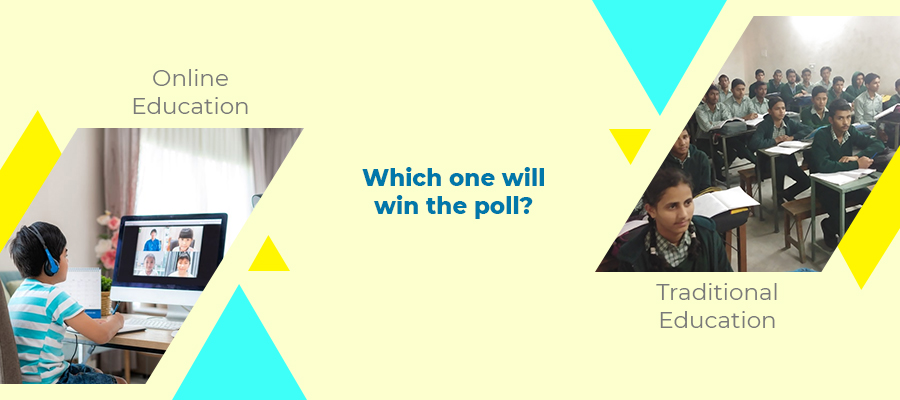Online education is the buzz these days, and why wouldn’t it be? It’s the latest trend in education, and we all know that whatever’s in trend will soon become a topic of discussion, and online learning is no different. But it doesn’t stop there. Students of the older generation argue that traditional education is better.
So we, as Ideal Education Point (New Choudhary Public School), decided to jump in the fire too. This web blog post will try to bring the never-ending debate to a conclusion. But before we start, which side are you on?
What is online education?
Online learning or online education in our Online Education School in Jaipur includes all teaching methods outside of the classroom over the internet. As compared to classroom education, online education has more accessibility and resources.
What is traditional education?
You are familiar with traditional education. It’s the way of sitting together in a classroom, opening a book and other physical material and learning via one respected faculty. Compared to online education, a classroom education has fewer resources and accessibility but more sense of being there together.
Online education:
Let us see the pros and cons of online learning.
Pros:
- Many resources and tools are available for teachers and students, such as PDFs, 3D presentations, audiobooks, and more to teach and learn more efficiently.
- Remote learning is possible, which helps a lot during situations such as the current pandemic.
- Flexibility in teaching and studying time.
- Online education is more affordable since there is no need for infrastructure, which takes high costs to build
- More attendance.
Cons:
- There are many resources available, accurate. But to access it a strong internet connection is required. On slower connections, other problems such as buffering can interrupt the classes.
- Remote learning is possible, but it removes the sense of togetherness.
- Flexibility in studying and teaching time leads to more indiscipline.
- Online education is more affordable, but the costs of fixing specific recurring technical issues are higher and trust us, it’s frustrating.
- Faculty unaware of technology shortcuts become victims to online trolling, which we as an RBSE Arts English Medium School in Sanganer Jaipur believe is unacceptable student behavior.
Traditional education
Now for the pros and cons of traditional learning at the Top RBSE School in Jaipur
Pros:
- Students sit in one room with a sense of awareness of reality and togetherness and are taught by one teacher.
- Students can ask doubts on the spot.
- This method is a more disciplined way of learning.
- The studies are conducted inside a beautiful architecture that itself gives a sense of being somewhere.
- Traditional way roll call ensures that only those students who are present get attendance.
Cons:
- The student-to-teacher ratio must be small due to lack of space so that teachers can teach adequately.
- Some students ask too many questions, which disturbs the schedule, and others ask doubts to stretch time.
- This method is more disciplined but not fun for all students as some students want to learn freely.
- The cost of making the infrastructure is expensive.
- There are chances of students not attending classes for various reasons, which is a loss for the students and the school and its faculty.
Online education vs. traditional education: critical points of differentiation
Now that you understand the best and bad of online education and traditional education. Let’s look at some final points of differentiation before concluding this debate (sort of).
- There are many resources available to learn in online learning. However, the easy access to resources makes students less productive. The case is the opposite of traditional education.
- In traditional learning, students sit in one classroom and learn on a fixed schedule. Online learning is more flexible and less disciplined.
- In online learning, teachers become trolls to online trolling. It happens in traditional classrooms too, where students try to disturb the class or the faculty, but those who completed their studies like this know that this doesn’t hinder the class, unlike online education.
- The last central point is attendance, which is essential because no learning will occur if students are not attending classes. In online learning, we get more attendance due to flexibility; the reverse is the case in offline learning.
Conclusion
From the above discussion, Ideal Education Point (New Choudhary Public School) concludes that both online education and traditional education have a fair share of pros and cons, meaning both are better. And the right choice is a matter of perspective. However, online education is becoming popular among a new generation of students and may soon wholly take over the traditional education system.
Online education is the buzz these days, and why wouldn’t it be? It’s the latest trend in education, and we all know that whatever’s in trend will soon become a topic of discussion, and online learning is no different. But it doesn’t stop there. Students of the older generation argue that traditional education is better.

You described all things very well. and according to me both are good, just demand on situations like during the corona online education was only way for education.
Good work, keep it up !
Hello there, just became aware of your blog through Google, and found
that it’s truly informative. I am going to watch out
for brussels. I’ll be grateful if you continue this in future.
Numerous people will be benefited from your writing.
Cheers!